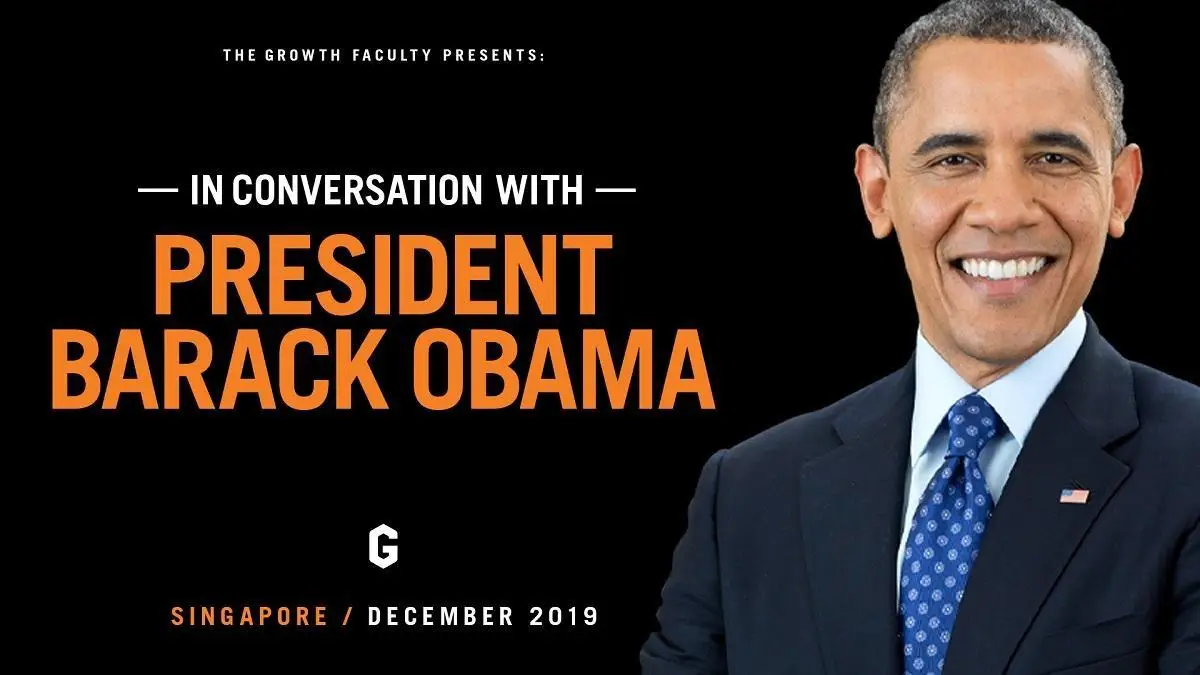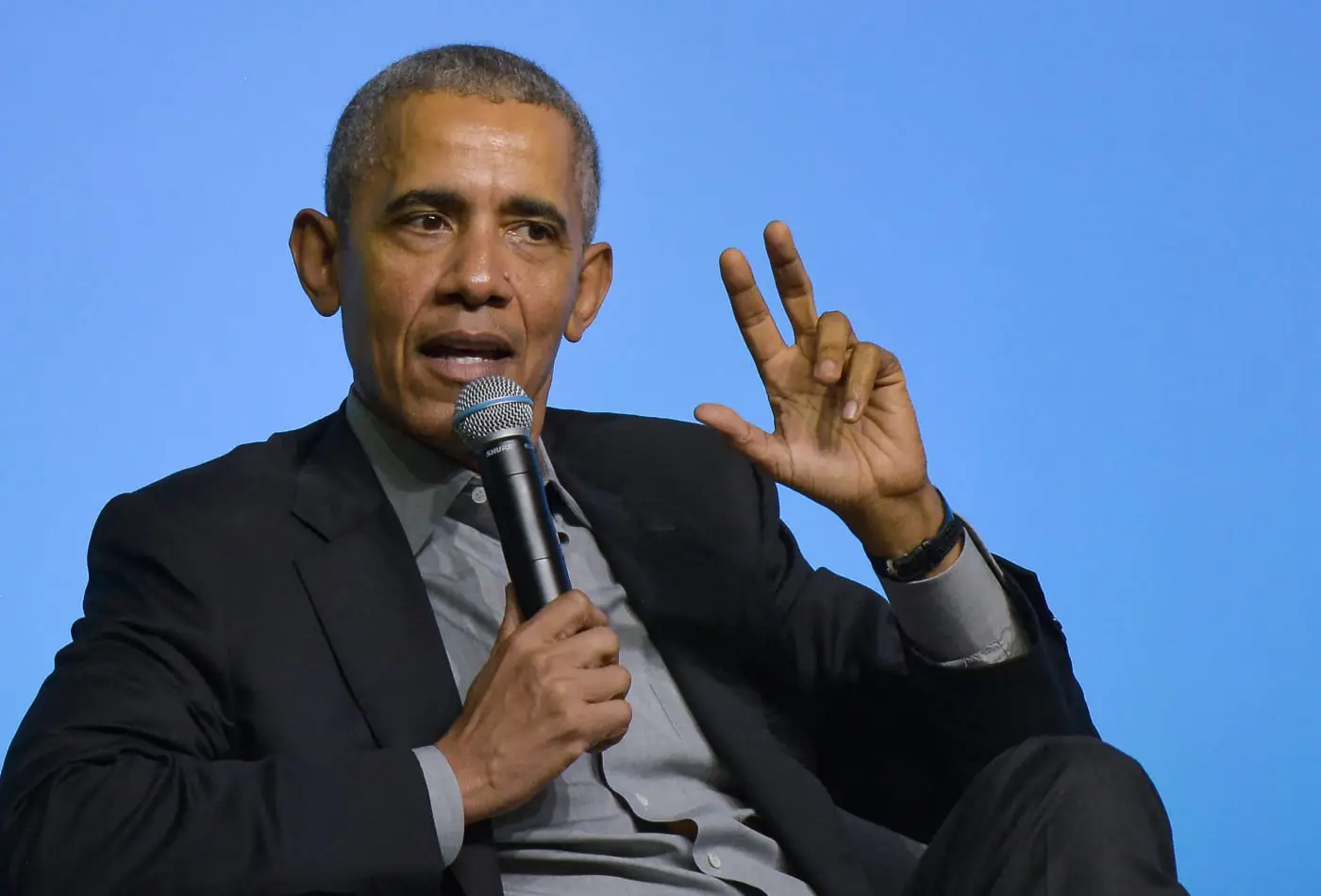
翻译:DotIN13
校对:天佑
What three things keep Barack Obama up at night?
哪三件事让Barack Obama夜不能寐?
The former U.S. president says that neither nuclear weapons nor terrorists make the list.
这位美国前总统说,这份清单里既没有核武器,也没有恐怖分子。
Instead, three newer issues have emerged that worry him: political polarization, climate change and social media.
相反地,是三个新近出现的问题让他感到担忧:政治极化、气候变化与社交媒体。
If those issues are not tackled soon, “we could end up having even greater problems than we do today,” he told a sold-out audience in Singapore on Monday at an hour-long event, “In Conversation with President Barack Obama.”
如果这些问题不能尽快得到解决,“我们可能会最终面对比我们今天更严重的问题,”周一,在新加坡举办的为时一小时的“对话奥巴马总统”活动中,他对满堂听众说道。
# 1. Global political polarization 全球政治极化
One worrying new trend is political polarization, both in advanced economies and in developing countries.
一个令人担忧的新趋势是政治极化,这种现象同时出现在了发达经济体与发展中国家中。
“If you ask me, probably the biggest trend that I’ve seen over the last decade is a return to some of the political trends and societal tensions that, you know, help lead to World War I and World War II,” said the 58-year-old former politician.
“如果你问我,促成了一战二战的某些政治潮流与紧张社会局势正在回归,这或许是我在过去十年间见过的最大趋势,”这位58岁的前政治家说道。
Noting people his age and younger have lived during times of “relative tranquility,” he recalled major events that resulted in “enormous optimism” around the globe: the fall of the Berlin Wall, the unification of Europe, the prison release of South African anti-apartheid icon Nelson Mandela, Chinese economic reform, globalization and a billion people lifted from poverty.
他特别指出与他同龄和比他年轻的人们经历了“相对平静”的时代,他回顾了那些引起全球范围内“极大乐观”的重大事件:柏林墙的倒塌、欧洲的联合、南美反种族隔离的标志尼尔森·曼德拉获释出狱、中国的经济改革、全球化以及全球十亿人口的脱贫。
Even after the September 11 terrorist attacks on the U.S., there was still a sense that the event was an anomaly in a world that was becoming more integrated, better educated and more tolerant, he said.
即便在剑指美国的9/11恐怖袭击发生后,人们仍然有一种感觉,仿佛这一事件只是这个越发一体化、受更好教育、更具包容性的世界的一个例外,他说。
But things started to change after the financial crisis of 2008.
但在2008年的金融危机之后,事情开始出现了改变。
“Even as the standards of living were rising and it looked like a relatively tranquil time, under the surface there was enormous disruption,” Obama said. “As a consequence of globalization, outsourcing, automation, blue-collar workers were losing jobs and status and felt as if their kids were not going to do as well as they were. There were winners and losers.”
“即便生活水平开始上升,世界看上去处于相对平静的时代之中,实则在风平浪静之下,暗流涌动,”奥巴马说。“由于全球化、产业外包、自动化,蓝领工人正在丢失他们的工作与社会地位,他们感觉就好像他们孩子的生活不会再像他们过去那样好。有赢家,就有败者。”
What you start seeing is this populist backlash... and strong men who would come in and oftentimes exploit some of those divisions.
你开始看到民粹主义的反扑... 还有那些会插手其中并且常常利用个中分歧谋利的社会精英。
“And the losers started feeling besieged,” he said.
“然后那些败者会开始感觉有如困兽,”他说。
Cultural disruptions in the Middle East, Asia and U.S. were also a factor, he said. “People who had traditional cultures felt as if those traditional arrangements were under assault.”
中东、亚洲与美国的文化混乱也同样是一大因素,他说道。“有着传统文化的人们感觉那些传统的规制好像在遭到破坏。”
“And, as a consequence, what you start seeing is this populist backlash — sometimes from the left, more often from the right — and a fallback to tribalism, racism, misogyny, ethnic or sectarian conflicts and strong men who would come in and oftentimes exploit some of those divisions.”
“结果就是,你开始看到民粹主义的反扑——有时来自左翼,更多的时候来自右翼——以及向宗族主义、种族歧视、反女性主义、种族宗派冲突的退化,还有那些会插手其中并且常常利用个中分歧谋利的社会精英。
# 2. Climate change 气候变化
Another worrying trend is climate change.
另一个令人担忧的趋势是气候变化。
“Those of you who still aren’t convinced on the science,” he said to the audience, “we can talk later.”
“你们中那些仍然在科学上质疑气候变化的,”他对观众说道,“我们可以等会再谈。”
He noted the “rapidity” of rising sea levels, melting polar caps, increases in the force and frequency of droughts, forest fires, hurricanes, tsunamis, flooding and the resulting population displacement.
他提到了海平面的“急剧”上升、极圈冰盖的融化、干旱强度与频度的上升、森林大火、飓风、海啸、洪水以及灾民的流离失所。
“You’re starting to see mass migrations resulting from things like that,” he added. “There’s fairly strong evidence that part of what precipitated the crisis in Syria had to do with this massive, longstanding drought that you’re going to see repeated in other parts of the world.”
“你们即将开始看到这些变化带来的集体迁居,”他补充道。“有非常有力的证据证明叙利亚的危机一定程度上与这次大规模、长时间的干旱脱不开干系,并且你们将在世界的其他地方看到这种干旱的不断重现。”
He warned that extreme weather shifts could affect the lives of millions around the world.
他警告道,极端气候变化会影响到世界范围内数百万人的生活。
“If you think about places like South Asia and the entire subcontinent, if monsoon season shifts rapidly or droughts or temperatures continue to rise in those areas, you’re looking at hundreds of millions of people who potentially are unable to feed themselves.”
“你想想看像南亚与整个次大陆那样的地方,如果在那些地方季风季节急剧变化、干旱来临或者气温持续上升,会有潜在的数以千万计的人们生活无以为继。”
“So I worry about that.”
“因此我为之感到担忧。”

# 3. Social media 社交媒体
The third trend that keeps Obama up at night is the rise of social media, which he called “an accelerant to some of these other trends.”
第三个让奥巴马夜不能寐的趋势是社交媒体的崛起,他将其称为“其他一些潮流的催化剂”。
“What we thought of as an enormous good — and I was an early adapter… but what we’ve seen is an increasing use of that technology to promulgate falsehoods and narratives of hate in the United States, in Europe, in Myanmar, around the world.”
“我们一开始认为社交媒体是一项重大的利好——而我也是很早就开始适应这一潮流……但我们看到的却是这项技术被更多地用来宣扬谎言,宣扬对美国仇恨的叙事,在欧洲,在缅甸,在全球都是如此”
... everybody has their own facts. You start seeing political breakdown as a consequence of that.
... 每个人都有他们自己的事实基础。我们开始看到政治因此而崩溃。
“And when you start contesting what’s true and what’s false, when debates aren’t just about opinions. It’s not just about how you or I may disagree on the best way to educate children or the best way to organize the economy, but now we’re disagreeing on: Is this a table? Or is this a chair? Or is this an elephant?” he said, touching the table in front of him.
“你开始争辩对错,辩论不再只是观点的博弈。它不再只是关于你或者我是不是对怎么最好地教育孩子、怎么最好地管制经济有所分歧,相反地,我们开始争论:这是不是一个桌子?又或者是一把椅子?再或者是一只大象?”他摸着他身前的桌子说道。
“There’s no agreed upon set of facts that we can agree to, and then test our ideas and opinions against some objective facts, but rather everybody has their own facts. You start seeing political breakdown as a consequence of that.”
“我们原本认可的事实不再能够得到认同,我们不再能对照着一些客观事实验证我们的想法与观点,相反地,每个人都有他们自己的事实基础。我们开始看到政治因此而崩溃。”
# Doing his best 竭尽所能
During the discussion, Obama also talked about what he misses about being president: the positive impact he could make, the intellectual challenge and his team. However, there are some things he doesn’t miss about it, such as the security bubble, the “pomp and circumstance” of cameras, and people standing up when he walked into a room.
在讨论中,奥巴马也谈到他所怀念的做总统时的一些东西:他能够做出的积极影响、对智谋的挑战以及他的团队。但是,其中也有一些他不愿重提的,比如安全泡沫、前拥后簇的镜头以及他走进房间便有人们起立致敬。
He also talked about how he kept his cool during the most stressful times of his presidency.
他也谈到了他在任期内最紧张的时期是如何保持镇定的。
“We set up a process that I trusted, where I had confidence we looked at every problem from every angle, using logic and reason and facts and data,” Obama said. “And so I could go to sleep at night feeling as if what I decided may not work. But nobody could have made a better decision than I made in that circumstance.”
“我们建立了一个我信任的系统,通过这个系统,我有信心我们能够使用逻辑、理性、事实与数据,从各个角度看每一个问题,”奥巴马说。“因此,我能在晚上入睡的时候感觉就好像即便我做出的决定没有效果,也没有人能在那种条件下,做出比我更好的决定了。”
“I could always feel like we did the best we could — for the right reasons.”
“我一直能感受到我们在竭尽所能地奋斗——为了正确的理由。”
原文:Published Mon, Dec 16 2019 11:27 PM EST, by Monica Buchanan Pitrelli